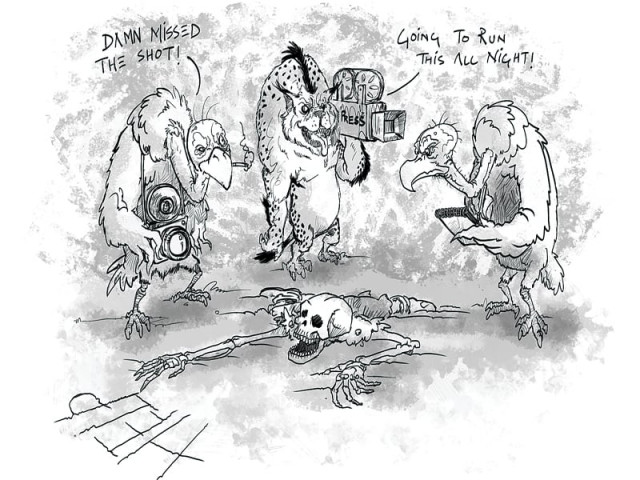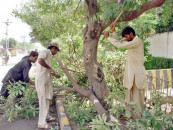Dealing in despair
Are journalists and writers in Pakistan profiting from the public’s losses?

Friend: You want to know the ingredients of writing a best-selling South Asian novel?
Me: Of course!
Friend: Pick a topic concerning abuse, terrorism, slums, racial divide, fundamentalism or extreme poverty, and make your country sound as horrifying as possible, then wait as thousands of publishers from around the world fight for your novel. Better yet, if you make the conditions of your country sound particularly barbarous, they’ll even buy the movie rights off you, right that second!
Me: But all I want to write about is love!
Friend: Won’t sell. Maybe if you’re writing about falling in love with a terrorist or, wait for it, a blasphemer (that concept’s still new), it just might work!
Me: Maybe I could write about the compassion in this country?
Friend: Boooooorrrring!
Me: The incredible places in Pakistan?
Friend: I’m already asleep.
Me: The amazing people here?
Friend: Have you been listening to a word I said?
As much as I hate to admit this, my friend was absolutely correct. I couldn’t think of a single well-known Pakistani author who had gained mass readership in the last few years by writing something unrelated to the above mentioned topics. If there was love, it was defeated by hate. If there was hope, it drowned in a sea of despair.
Whether it was Mohsin Hamid’s The Reluctant Fundamentalist, Kamlia Shamsie’s Kartography or Bina Shah’s Slum Child, everyone seems to be capitalising on the ills of our country. This tried and tested formula is sure to attract the attention of the developed world who may find these details of our country shocking and gruesome. However, for you and me — people who witness these grim realities up close on a daily basis – all we can do is revise a cliché and say: ‘been there, seen much worse!’
In times of war, historians have noted that audiences tend to become more inclined towards watching comedies or reading lighter literature. Why wouldn’t they? When the world around you is falling apart, you do not want to be repeatedly reminded of it every time you read a book or watch a movie. People want to laugh and maybe even escape their realities for a brief moment. This is why fantasy literature often becomes the next best option. Even satire and spoofs work well in these times as they help audiences deal with the anger and bitterness they feel at the chaos that surrounds them and the venality of their leaders.
Consider Charlie Chaplin. He would never have become such an acclaimed celebrity if he was too scared to spoof Hitler at a time when the entire continent of Europe quaked with fear at the sound of Nazi jackboots. It wasn’t that he buried his head in the sand and avoided the reality of impending war. Instead, he took that fear and turned it into laughter.
So my question to the Pakistani authors of our time is, why can’t you do that? Is it really necessary to torture us with our daily darkness?
Books aside, even electronic media covers absolutely everything under the sun that shows Pakistan in a negative light and covers up the amoebic portion of good still surviving in this country.
“Press’ vans rush to those places where a bomb explodes even before the ambulances arrive. Cameramen callously scour the place for any bodies, bloody limbs, charred ID cards or screaming kids that they can film. The gorier the coverage, the better!
Of course, any compassionate or brave men who assisted the ambulances or helped the victims are not worth filming. Better yet, they’ll ask these men to step aside, so they can get a shot of the man who is still breathing despite the fact that his entire skull is showing through his head. God forbid, they should rush the poor man to the hospital and lose out on the money shot.
It’s not just Pakistani journalists who drop their ethics and morality when they pick up a pen or camera. The paparazzi’s desperate desire for a Princess Diana picture with Dodi Fayed contributed to her death in August 1997. The News of the World is believed to have been responsible for 4,000 phone hacking attacks not limited to just Hollywood celebrities or cricketers, they even allegedly hacked the phones of the parents of two murdered schoolgirls Holly Wells and Jessica Chapman. Worse, they hacked the phone of the murdered schoolgirl Milly Dowler, even erasing messages when the mailbox got full, leading police to believe the girl was still alive. Families of British soldiers killed in Iraq and Afghanistan were fair game as well, as were the relatives of those who had died in the 7/7 bombings. No one was off limits for this publication —– not even dead people!
It’s times like these when these writers and journalists remind me of the South African photo journalist Kevin Carter. For anyone who doesn’t know the Carter legacy, he won a Pulitzer prize for taking a picture of a severely emaciated Sudanese toddler, on the brink of death from starvation, crying as a vulture landed near it — the vulture almost seconds away from gorging on the little one.
While most people raved about the picture, St Petersburg Times rightly noted about Carter: “The man adjusting his lens to take just the right frame of her suffering might just as well be a predator, another vulture on the scene.”
However, thirty-three-year-old Kevin Carter, after suffering from severe depression, committed suicide from carbon monoxide poisoning. Ironically, it was exactly a year after his picture became infamous.
At least, Kevin Carter had a conscience and felt guilty about what he did, even if it was too late. I doubt if any of our journalists feel the slightest bit of remorse for constantly showcasing the devastation in this country.
Their response to my question will always be the same. “We are raising awareness about the critical issues of Pakistan.” Well, guess what? We know our issues! We know there are thousands of bodies lying around on any given day at masjids, dargahs and shopping centres. The entire world knows our issues!
Instead of doing something about it, do you have to put our issues on a tray and display it to the entire world, while you make tons of money along the way for someone else’s suffering?
I ache for the day someone will write on the beauty, compassion and love in this country, and still make it big. I look forward to the day Pakistani authors will make the world laugh. I’m hoping I’ll be that writer. But the question is, will you be interested in reading what I write?
Published in The Express Tribune, Sunday Magazine, July 31st, 2011.


















COMMENTS
Comments are moderated and generally will be posted if they are on-topic and not abusive.
For more information, please see our Comments FAQ